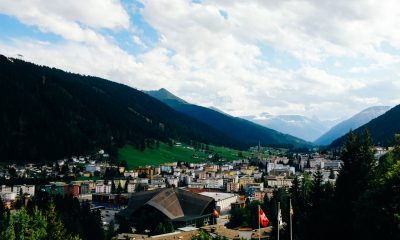Featured
The challenge of decarbonization and the shift to a green economy
The problem of climate transition is far more extensive and complex than the pictures of wind turbines and solar panels that are readily available in ESG fund prospectuses. More and more companies are turning to ESG strategies in order to attract investors. However, the latter should not only rely on the companies’ reports, as they would only show investors what they want to see.

Industry, transport, materials, energy and energy suppliers: a large number of ESG strategies de facto exclude polluting sectors. For good reason: they are responsible for 90% of the world’s carbon emissions. Often, these strategies opt instead for shares of zero-emission companies, for example in technology or healthcare, thus improving the ESG scores of their funds. Is the world really going to achieve the climate transition by turning a blind eye to the “bad guys” who are vital to the economy?
For Joe Mares, Portfolio Manager at Trium Capital, the answer is no: “We need to work with companies in these sectors that are implementing strategies to reduce their CO2 emissions,” explained the manager of an ESG neutral equity market fund.
“We need to improve the steel and chemical sectors, shipping, aviation, cement, mining and packaging.”
In responsible finance, money generally goes into the “greenest” portfolios. One approach is to deploy exclusion filters to eliminate polluting sectors, to the benefit of green sectors. However, the problem of climate transition is far more extensive and complex than the pictures of wind turbines and solar panels that are readily available in ESG fund prospectuses. How can investors ensure that the money invested will sustainably reduce CO2 emissions across all sectors of the economy? “To do this, we need to tackle the problem of global emissions by improving the steel, chemicals, shipping, aviation, cement, mining, and packaging sectors,” said Joe Mares, who identifies companies in this heterogeneous group with significant potential for transformation, and selects those whose management teams really want to divest polluting activities.
“You can’t be satisfied with annual sustainability reports because a lot of companies only show what investors want to see. Instead, you have to think about the whole system of the company and all its business flows.” Of course, some sectors will not change, such as thermal coal mining and tropical forest exploitation.
Find out more about the shift to a green economy and the importance to reduce the pollution with our companion app. The Born2Invest mobile app brings you the latest business news in the world.
Tomorrow’s winners may not be the companies we think about today
They may be the sectors that are changing or companies that will be able to successfully evolve their business model in line with the climate transition. “Ten years ago, all analysts were negative on the shares of the two oil refiners, ERG and Neste, which decided to restructure their activities,” explained Joe Mares. The Italian ERG had sold all its oil-related activities to develop wind power projects. Finland’s Neste used its existing structure and network of oil stations to develop a biodiesel business in addition to its core business. “These two companies that chose to divest from fossil fuels finally saw, after a few years, a resurgence in their revenues and share prices,” he said.
Time will have proved these reconversions right, while some photovoltaic companies of the time have disappeared for various reasons. “Investors think that some activities such as oil services have no future. But the companies involved may also decide to make a transition into renewable products. It’s interesting to see how companies will evolve in 5 or 10 years,” explained the manager who selects companies ready to embark on decarbonization and whose impact will be more significant than companies in zero-emission sectors.
The European green deal
There are also regulatory opportunities to be seized for a host of companies in all economic sectors. Europe, for example, has embarked on a transition to a green economy. “It is no longer just about electricity and the electricity suppliers that have started the process, but also about construction, industry, and transport.”
A quarter of emissions come from buildings. The Green Deal will multiply initiatives to optimize construction to new environmental standards and encourage renovation. These are great opportunities for change for agile companies in cement, glass and electricity.
__
(Featured image by Caniceus via Pixabay)
DISCLAIMER: This article was written by a third party contributor and does not reflect the opinion of Born2Invest, its management, staff or its associates. Please review our disclaimer for more information.
This article may include forward-looking statements. These forward-looking statements generally are identified by the words “believe,” “project,” “estimate,” “become,” “plan,” “will,” and similar expressions. These forward-looking statements involve known and unknown risks as well as uncertainties, including those discussed in the following cautionary statements and elsewhere in this article and on this site. Although the Company may believe that its expectations are based on reasonable assumptions, the actual results that the Company may achieve may differ materially from any forward-looking statements, which reflect the opinions of the management of the Company only as of the date hereof. Additionally, please make sure to read these important disclosures.
First published in allnews.ch, a third-party contributor translated and adapted the article from the original. In case of discrepancy, the original will prevail.
Although we made reasonable efforts to provide accurate translations, some parts may be incorrect. Born2Invest assumes no responsibility for errors, omissions or ambiguities in the translations provided on this website. Any person or entity relying on translated content does so at their own risk. Born2Invest is not responsible for losses caused by such reliance on the accuracy or reliability of translated information. If you wish to report an error or inaccuracy in the translation, we encourage you to contact us.

-

 Fintech2 weeks ago
Fintech2 weeks agoSwissHacks 2026 to Launch Inaugural Swiss FinTech Week in Zurich
-

 Cannabis6 days ago
Cannabis6 days agoColombia Moves to Finalize Medicinal Cannabis Regulations by March
-

 Crowdfunding2 weeks ago
Crowdfunding2 weeks agoReal Estate Crowdfunding in Mexico: High Returns, Heavy Regulation, and Tax Inequality
-

 Markets1 day ago
Markets1 day agoMiddle East Escalation Sparks Market Uncertainty as Oil and Gold Poised to Rise

























